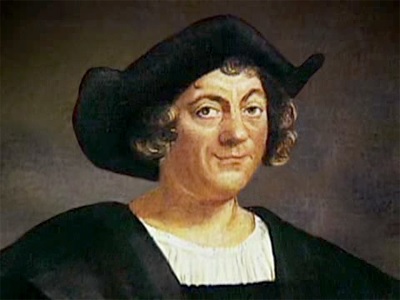
I hate October 12.
It’s the day I’m supposed to wave la bandiera d’Italia, the Italian flag. I’m proud to be southern Italian, which means, in many cases, being mixed blood, witness my mother’s maiden name “Mecca.” That’s what happens when your land is colonized for 1500 years by every invading army that could muster up a ship and some weapons.
But wave il tricolore (the three colors) for Columbus? Hell no.

Why is Columbus even a hero to most Italian Americans? He had nothing to do with us. He may have been born in Genoa, but he sailed for Spain, not Italia. There was no Italia at the time he set off in the Nina, the Pinta and the Santa Maria. Italia was a collection of nation states, including the Kingdom of the Two Sicilies in the south where my family barely eked out a living.
Italia became a unified nation almost four centuries after Columbus, during what’s called the Risorgimento (resurgence or rebirth). At that time, Giuseppe Garibaldi freed the southern half of the country from Spain, which occupied it at the time. The northern Italian government didn’t exactly welcome the southerners and proceeded to tax the hell out of the already dirt poor farmers.
The result was a mass exit from il mezzogiorno, as southern Italy is called.
La statua della libertà didn’t want exactly welcome those uneducated contadini (peasants) either. Just ask Sacco and Vanzetti, those “dago” anarchists executed for a murder they didn’t commit. Or those Italian immigrants lynched in New Orleans and Tallulah, Louisiana. Or those “experts” who proclaimed that we would never amount to anything because we were a separate inferior race.
Many of us who got off the boat at Ellis Island expecting streets paved with gold ended up organizing and fighting the inhumane working conditions we and other workers were forced to endure. Southern Italian women and men were in the forefront of the Lawrence textile strike in Massachusetts; the Mesabi Iron Range strikes; the Westmoreland, Pennsylvania mining strike; the Ludlow, Texas strike; the New York garment workers strike; two Longshoremen’s strikes; and so many other efforts to improve the lives of those who slaved long hours for next to nothing.
About 100 Italian language anarchist newspapers flourished by the early part of the last century. One of them, Il Grido degli Oppressi (Cry of the Oppressed) described Columbus as “a man without principles, without any noble purpose, but consumed with the desire to plunder and command.” His conquest of the Americas, the publication declared, laid the groundwork for “racial prejudices and hatreds,” such as “the martyrdom of the negroes in the South.”
According to Immigrants Against the State: Yiddish and Italian Anarchism in America (by Kenyon Zimmer), southern Italian anarchists “sporadically disrupted Columbus Day parades in Italian American communities.” The embracing of Columbus Day was and is not universal among Italian Americans, as it’s often believed. Rather, it was no doubt an attempt by the more assimilationist elements of the Italian immigrant community to gain more acceptance in a mainstream Anglo culture that saw us, at best, as marginal whites. Italian anarchists, on the other hand, believed that our advancement in this Anglo culture could only be achieved in solidarity with other oppressed groups.
Today, many of us grandchildren and great grandchildren of those Italian and Sicilian immigrants continue to believe in solidarity. We march with workers for a living wage; fight against queer and trans oppression; organize against racism, sexism, ableism and ageism; speak out for national healthcare for all; fight the criminalization of poverty and homelessness; and work against the gentrification and displacement of working-class people. We mobilize every day for social and economic justice, as our ancestors did a century ago. We see ourselves in the faces of those who are newly arrived in an America that, despite its reputation, has never welcomed immigrants.
We want nothing to do with the legacy of this man called Columbus.



I agree. But what’s even more ridiculous is that Columbus sailed under the Spanish flag not the Italian flag. In Spain, he is a hero. In Italy, not so much.
“Today, many of us grandchildren and great grandchildren of those Italian and Sicilian immigrants continue to believe in solidarity.”
Solidarity with your ancestors. How many generations is it supposed to last? I share a family name with a famous Russian author but feel no particular love or connection with the place. According to Gore Vidal, European immigrants were called “hyphenateds” in the late 19th century: Italian-Americans, Polish-Americans, etc.
Tommi continues that proud tradition.
My 4 year old niece asked me last night, “What’s Columbus Day?” I said, “That’s the day America celebrates the enslaver of the Indians.”
The fact that Columbus Day is kind of a half-holiday in this country may reflect others opinions on the matter. Some banks are closed, others are open. Some schools close, others don’t . Some cities have trash collection, some don’t . Its a federal holiday but employees who work don’t get time and a half pay.
The myth that Columbus “discovered” America was disproven years ago. There were people living in the continents of North and South America for over 10,000 years prior to the “discovery” by Europeans.